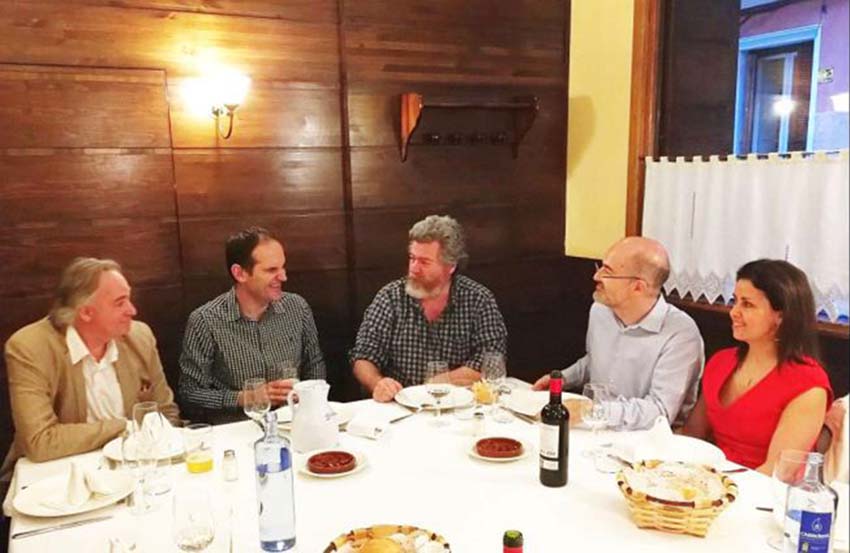Reality confirms that Basque is a language available to anyone “wishing to learn another language,” Karlos Cid Abasolo says, professor of Basque Philology at Complutense University in Madrid, at a dinner conference about “The Myth of the Difficulty of Euskera” held on May 23rd. The article is written by Francisco de Paula Garcia Martin, on the web Culturavascaenmadrid.com, site of the Royal Society of Friends of the Country (RSBAP) in Madrid.
Francisco de Paula Garcia Martin. This new activity of the RSBAP gathered some 20 people attracted by the focus of the event, and its relaxed format and with a surprising announcement that, yes, it is possible to speak and understand, read and write in Basque, dedicating the same intensity to the corresponding effort of learning English or French, for example.
“The importance of Euskera the Basque is obvious,” according to Court Delegate of the RSBAP, Íñigo López de Uralde, at a presentation at the after-dinner meeting at the Zerain Restaurant. In a climate of curiosity, Cid Abasolo proposed a didactic content accessible to all with the goal of achieving “Spanish speakers realizing that Euskera isn’t as hard to learn as many say, or think.”
Breaking taboos
It is clear that there are some premises to learn Basque. The most important: anyone unable to learn another language, would also have a hard time with Euskera, the same way that people who have a “knack for other languages,” do so faster and better.
Based on this consideration, Professor Cid Abasolo, described how there are other alleged obstacles which have created a dogma of mythological faith about the banality of the effort to learn Basque, unless it is undertaken with more commitment than to learn any other language that uses the western alphabet. It isn’t easier, he explained, to learn a Romance language such as Italian or Portuguese…which requires an equally intense effort for Spanish speakers who pretend to go beyond capturing sounds or emitting a “chapurreo” that directs them towards the Via del Corso or the Plaza de Comercio, let’s say….because you can also be guided in Berlin by signs and words to locate the Brandenburg Gate for the hotel. It is very different to know Italian, Portuguese or German.
The is, according to Cid Abasolo, a sociolinguistic barrier when we embark on learning Euskera by its character as a minority language, with a social role that is still taking steps in society. In fact, the extension of the social use of any language has an exponential impact on its learning processes. Something like Spanish “Erasmus” that spend an entire year living in French with various colleagues in their hometowns, and that upon their return, are faced with the fact that they have no idea how to speak French….
Self-criticism also had a place at the conference, considering the necessity of “simplifying and de-dramatizing” of the learning process, as one of the best didactic materials available to work in Euskera, also “derived from their minority status.” The latter is a field that requires more time and resources on the part of those implicated and responsible for its diffusion.
Relaxation Decalogue
Before sparking an animated debate, full of questions, personal experiences, in a good climate for an hour after the presentation, Cid Abasolo proposed various considerations about the strong points of Euskera as a language that can be learned by Spanish speakers. His Decalogue follows:
- Euskera, as English has no gender distinction.
- It is pronounced like Spanish
- The five vowels are the same.
- Accentuation follows the same patter for all words, and there are no accents!
- There are very few irregular verbs.
- Spelling isn’t hard.
- You don’t have to go far for linguistic immersion (unless you live on another continent)
- Media in Basque is available to anyone that has internet (all over the world).
- Time required to learn is similar compared to any other language.
- Motivation to begin and keep learning is rewarded, among other things, by the satisfaction of known a thousand-year-old language.
(Originally published in Culturavascaenmadrid.com)






 Send to a friend
Send to a friend Add comment
Add comment








